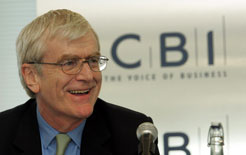
THE recovery in the UK economy is expected to remain sluggish during 2010, and will not pick up much pace until the middle of next year, reports the CBI.
WE EXPECT growth prospects for the economy will be fragile in the near-term now that certain stimulus measures – such as the VAT cut and car scrappage scheme – are ending.
Growth in consumer spending will remain subdued this year, as people save more and worries about job security persist.
The economy is expected to grow in the first two quarters of 2010, by 0.3% and then 0.4% respectively, and by a slightly faster 0.5% in the next two quarters. As global demand, consumer spending and business investment strengthen through 2011, the pace of growth should then pick up, though GDP is still not expected to have returned to pre-recession levels by the end of 2011.
We predict annual UK GDP growth of 1.0% in 2010; followed by 2.5% in 2011. The Bank of England is forecast to move away from the current emergency rate, with a small rise in interest rates in the third quarter of 2010, which is later than previously expected. Further small incremental increases would take the Bank rate up to 2% by the end of 2011.
Richard Lambert, CBI director-general, commented: “The economic outlook is improving, but the lack of a clear driver for growth will make for a bumpy ride in the months ahead. The CBI expects the recovery in 2010 to be slow and sluggish, with few signs of real strength until well into next year.
“To convince international investors that the spiralling budget deficit will not derail the economy, the government must set out a credible plan to balance the books by 2015-16, two years earlier than currently planned.
“It must also avoid damaging tax rises. Targeted spending cuts and smart re-engineering of public services can preserve front line services and deliver the savings that will have to be made. At the same time, it is vital that business has the space to grow, invest and create new jobs. That’s the only way out of our current fiscal mess.”
Our view on inflation
Inflation is expected to be slightly higher than previously forecast in the near-term, but is expected to fall back considerably this year, with CPI inflation dropping below the Bank of England’s 2% target by the end of 2010 and remaining below target throughout 2011.
Unemployment is expected to continue rising and will peak in the autumn. But the CBI now expects the number of people out of work to be slightly lower than previously thought, at around 2.75 million.
Household spending is not expected to rise strongly this year, as consumers remain worried about job losses, see weak ongoing wage growth and opt to increase savings and cut debts. Household consumption is forecast to increase by just 0.7% in 2010 and by 1.9% in 2011.
The household saving rate is expected to be higher than previously thought this year, rising to 9% at the end of the year, and only easing back at the end of 2011.
Ian McCafferty, CBI chief economic adviser, commented: “The state of the public finances means this recovery will be led by the UK consumer, private sector investment and the re-building of stocks. But headwinds from tight credit conditions and the desire to borrow less and pay down debt will hold this back somewhat.
“After peaking in the autumn, unemployment will come down very gradually next year. With inflation likely to fall back quite sharply due to the large amount of spare capacity in the economy, monetary policy will remain easy, though the Bank is expected to move away from the current emergency 0.5% rate later this year.”
The prospects for exports
UK export growth will be supported by the strengthening global economy and the competitiveness of Sterling. Exports are expected to grow more strongly than imports next year, with net trade making a positive contribution to output growth.
Business investment, which saw a sharp contraction last year, is expected to fall further in 2010, but recover in 2011 when economic conditions will be somewhat stronger.
The public finances remain in very poor health, and even though a smaller fall in tax receipts and slightly weaker growth in government spending than expected mean the estimate for net borrowing in 2009-10 has been revised down to £168, this still represents 12% of GDP. Net borrowing is then expected to reach £177 billion in 2010-11, before falling to £149 billion in 2011-12.







